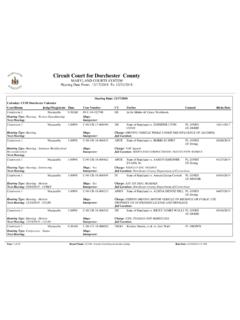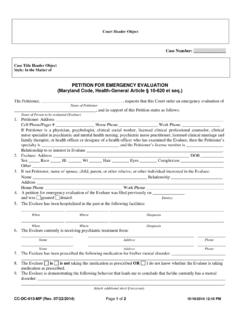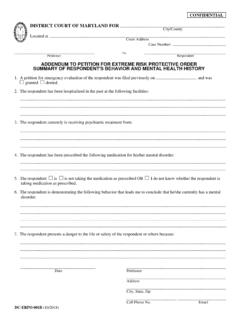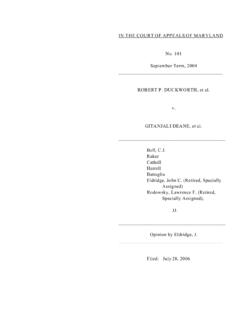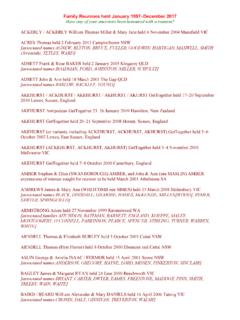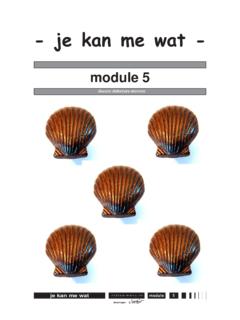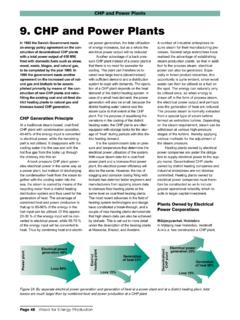Transcription of Amicus curiarum - Maryland Courts
1 Amicus curiarum VOLUME 21. ISSUE 2 february 2004. a publication of the office of the state reporter Table of Contents COURT OF APPEALS. Civil Pro cedure Consolidation of Causes of Action Jenkins v. College Park .. 3. Criminal Law Jury Communications Denicolis v. State .. 5. Family Law Child Custody Frase v. Barnh art .. 6. Utilities Electricity Easton v. PSC .. 7. COURT OF SPECIAL APPEALS. Administrative Law Exhaustion of Administrative Remedies Massey v. Galley .. 9. Civil Pro cedure Summary Judgment Ross v. American Ironw orks .. 10. Constitutional Law Right to Speedy Trial Brown v. State .. 13. Self Incrimination In Re: A riel G.. 15. Criminal Law Breaking and Entering Holland v. State .. 17. Evidence Expert Testimony Sams un v. Ben nett .. 18. 361 Rowe Boulevard, Annapolis, Maryland 21401 410-260-1501. Evidence Nolle Prosequi State Fa rm v. Ca rter.
2 20. Family Law Child Supp ort Corby v. McCarthy .. 21. Goshorn v. Goshorn .. 24. Grandparent Visitation Herrick v. Wain .. 25. Insurance Uninsured Motorist Coverage Crespo v. Top i .. 27. Maryland Mortgage Lender Law Penalties Thrasher v. Homecom ings .. 28. Prisoner Litigation Act Waiver of Filing Fees Massey v. Inmate Grievance Office .. 28. Workers' Compensation Covered Employee Fitzgerald v. R&R Tucking .. 30. ATTORNEY DISCIPLINE .. 32. JUDICIAL APPOINTMENTS .. 33. COURT OF APPEALS. CIVIL PROCEDURE - CONSOLIDATION OF CAUSES OF ACTION - MOTION TO. CONSOLIDATE ABUSE OF DISCRETION A TRIAL COURT ABUSED ITS. DISCRETION IN DENYING A MOTION TO CONSOLIDATE A QUIET TITLE ACTION. WITH TWO OTHER QUIET TITLE ACTIONS DEALING WITH THE SAME PARCEL OF. PROPERTY. REAL PROPERTY QUIETING TITLE IF A PARTY HAS A VALID TITLE IN A. PARCEL OF PROPERTY AND IS NOT NAMED A DEFENDANT IN AN ACTION TO.
3 QUIET TITLE BY ADVERSE POSSESSION IN THAT PROPERTY, THAT PARTY IS. ENTITLED TO BE A NAMED PARTY IN THE ACTION; NOTICE BY PUBLICATION. MAY NOT SUFFICE AND ANY SUBSEQUENT DEFAULT JUDGMENT MIGHT BE. INVALID. Facts: On July 3, 1997, Mr. Jenkins filed a complaint to quiet title in the Circuit Court for Prince George's County for a property he claimed to own by adverse possession. Jenkins named the following as defendants in that complaint: the successors and assigns of Fillmore Beall and James C. Rogers, trustees; the heirs, successors, personal representatives, devisees and assigns of Francis Shanabrook; and any and all persons claiming an interest in the specified property. Jenkins did not name the City of College Park (the City) as a party. Jenkins asserted that the whereabouts of the defendants named in the suit were unknown and that no other persons claimed a right to the property.
4 Jenkins then served process by publication and, after no response was filed, a default judgment was entered on December 10, 1997. Jenkins filed a second complaint to quiet title in the Circuit Court for Prince George's County on April 17, 1998. concerning a parcel of property contiguous to the parcel subject to the 1997 action. The City was not named as a defendant. Jenkins again claimed title through adverse possession and he named the same defendants as in his 1997 action. After receiving no response to Jenkins's service by publication within the appropriate time period, a default judgment was entered on May 13, 1998. The parcels of property involved in these two complaints are located adjacent to property that Jenkins had previously acquired by deed. The City disputes Jenkins's assertions regarding title in the property. The City alleges that the parcels involved in this case overlap with the railway right of way owned by the City.
5 The City allegedly acquired its interest in the property by quitclaim deed from The Bank of New York which was recorded on April 21, 1997, prior to Jenkins filing any complaint to quiet title. The full -3- record of conveying instruments of this alleged chain of title are absent from the record in this case. The City alleges, however, that a problem occurred within title lines of the property when Francis Shanabrook, who previously owned both properties, conveyed a parcel of property to both Horace Miller and the Columbia and Maryland Railway. On June 15, 2001, the City filed a Motion to Intervene and to Amend Judgment in both of Jenkins's quiet title actions. Along with this intervention request, the City argued that all three actions be consolidated. The Circuit Court consolidated the two actions initiated by Jenkins but denied the motion to consolidate Jenkins's actions with the one initiated by the City.
6 The trial court also denied the City's motion to intervene and amend judgment, stating that they were untimely. Held: The Court of Appeals held that the trial court abused its discretion in denying the City's motion to consolidate its quiet title action with the two actions filed by Jenkins as all three actions might involve the same parcel of property. The Court of Appeals vacated the trial court's denial of the City's motion to consolidate and motion to intervene because the record was silent as to pertinent facts necessary for the proper examination of those issues. Because of the incomplete record before it, the Court of Appeals did not reach the specific questions presented on appeal. It did, however, state that if the City has valid title to the property and was entitled to be named a defendant to Jenkins's quiet title actions pursuant to 14-108 of the Real Property Article, then Jenkins's affidavits causing the trial court to order notice by publication, and the subsequently obtained default judgments in his favor, may have been invalid.
7 The Court of Appeals directed the trier of fact to resolve these and other issues involving the chain of title of the property on remand. Jenkins v. City of College Park, No. 37, September Term, 2003, filed December 19, 2003. Opinion by Cathell, J. **. -4- CRIMINAL LAW - JURY COMMUNICATIONS. Facts: After pleading guilty on several counts of robbery, petitioner, while awaiting sentencing, allegedly solicited a fellow cellmate to have the judge and the prosecutor in his case killed. The cellmate disclosed the arrangements to the authorities and petitioner was charged by criminal information with two counts of solicitation to commit murder. Neither count identified the victim, and throughout the trial there were different references as to which victims the counts of solicitation applied to. During trial, four notes were received from the jury, the third of which, asked for a definition of solicitation.
8 The note appeared in the record and was labeled as a court exhibit yet the record revealed no mention of or response to it. It was not time-stamped and counsel were unaware of it until after the verdict had been taken, sentence had been imposed, and appellate counsel discovered it in the record. The jury returned a guilty verdict on both counts and the judge imposed sentences for two counts of solicitation, one as to the judge and the other as to the prosecutor. After pronouncement of the sentence, defense counsel advised that the two solicitations related only to the judge. The trial judge then corrected the sentences to refer only to the judge and not to the prosecutor. Petitioner appealed to the Court of Special Appeals, complaining that the criminal information was defective because it failed to name the victims and was confusing and that the court erred in receiving a note from the jury without disclosing it to counsel or petitioner.
9 The Court of Special Appeals held that the first complaint was not preserved for appellate review and that with respect to the jury note, because the record was silent, that petitioner failed to establish that error had been committed. Held: Reversed. Counsel must be informed of jury communications and the State must show that error regarding jury communications was harmless beyond a reasonable doubt. A silent record cannot support a harmless error analysis because the record must affirmatively show that the communication (or response or lack of response) was not prejudicial. In this case, the note, which was clear to have been received and to which petitioner was not informed of, asked for a definition of solicitation, which was not a collateral or peripheral issue. Denicolis v. State, September Term, 2003, filed December 10, 2003. Opinion by Wilner, J.
10 **. -5- FAMILY LAW - CHILD - CUSTODY- CONDITIONS ON CUSTODY- THIRD PARTY. VISITATION. Facts: Petitioner Deborah Frase, was the mother of three children when she was incarcerated in the Talbot County Detention Center. During her incarceration, Ms. Frase's son, Brett Michael, was cared for by Mr. and Mrs. Barnhart. After serving eight weeks in prison, Frase was released and sought to regain custody of her children. Soon after, the Barnharts filed a complaint for custody of Brett Michael. Frase filed a pro se answer and counterclaim for custody. After contacting a number of legal service agencies, Frase was unable to obtain counsel. After an evidentiary hearing before a master, Frase was awarded custody of Brett provided that she apply for and obtain housing at a shelter, that she grant the Barnhart's weekend visitation with Brett, and that she cooperate in further review hearings.






